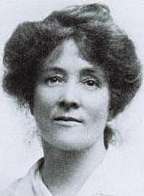Ada Nield Chew
Ada Nield Chew (28 January 1870 – 27 December 1945) was a British suffragist.
Ada Nield Chew | |
|---|---|
 | |
| Born | Ada Nield 28 January 1870 North Staffordshire, United Kingdom |
| Died | 27 December 1945 (aged 75) Burnley, United Kingdom |
| Nationality | British |
| Occupation | Suffragette, Social Activist |
| Spouse(s) | George Chew ( m. 1897–1940) |
Life
Nield was born on a farm near Butt Lane in North Staffordshire on 28 January 1870, daughter of Willam and Jane (née Hammond) Nield. She was one of 13 children.[1] She left school at the age of eleven to help her mother take care of house and family. When she was in her twenties she worked as a tailor in a factory in Crewe, Cheshire, but was dismissed after writing a series of letters to The Crewe Chronicle which criticised working conditions in the factory. Following this she became active in the Independent Labour Party and in 1896, she toured the north-east of England in the Clarion Van to publicise the ILP's policies. Shortly afterwards, in 1897 she married George Chew, another ILP organiser. Their daughter, Doris, (and only child) was born in the following year. Chew then became an organiser for the Women's Trade Union League.
In the years leading up to the First World War, Chew became an active supporter of the movement for women's suffrage. According to her daughter, Chew as a working class woman, sometimes felt patronised by the middle class leadership of the movement. This was reflected in a lively correspondence with Christabel Pankhurst in the pages of The Clarion during 1904. In the provinces she with Selina Cooper and Margaret Aldersley were experienced labour activists in Lancashire.[2] Chew became a member of the National Union of Women's Suffrage Societies and worked for this body as an organiser from 1911 to 1914. The main focus of her work was in winning support for the cause through contacts in the labour movement.
During the First World War Chew adopted a pacifist stance and was active in the Women's International League for Peace and Freedom and other anti-war organisations.
After the end of the war, and the achievement of women’s suffrage in 1918, Chew withdrew from any major involvement in politics, preferring instead to concentrate on building up the mail-order drapery business which she founded. She retired from the business in 1930 and undertook a round-the-world tour in 1935. Her husband died in 1940, and Chew herself died on 27 December 1945 at, Burnley, Lancashire. She was cremated and her ashes scattered on the Rose Lawn at Rochdale Cemetery. She was survived by her daughter, Doris, who later edited a selection of her writings together with a brief biography.[3]
Archives
An oral history interview between Brian Harrison and Doris Nield Chew, about her mother, Ada, is held at The Women's Library.[4] It is one of over 200 interviews made in the 1970s as part of 'Oral Evidence on the Suffragette and Suffragist Movements: the Brian Harrison interviews'.
Posthumous recognition
Her name and picture (and those of 58 other women's suffrage supporters) are on the plinth of the statue of Millicent Fawcett in Parliament Square, London, unveiled in 2018.[5][6][7]
See also
References
- "Chew, Ada Nield (1870–1945), labour organizer and suffragist | Oxford Dictionary of National Biography". doi:10.1093/ref:odnb/9780198614128.001.0001/odnb-9780198614128-e-39080. Cite journal requires
|journal=(help) - Sandra Stanley Holton, Feminism and Democracy: Women's Suffrage and Reform Politics in Britain, 1900-1918, Cambridge University Press (2002) - Google Books pg. 68
- Chew, Ada Nield; Chew, Doris (1982). Ada Nield Chew. Virago Press. ISBN 978-0-86068-294-3.
- "Library of the London School of Economics, ref 8SUF/B/037". Oral Evidence on the Suffragette and Suffragist Movements: the Brian Harrison interviews.
- "Historic statue of suffragist leader Millicent Fawcett unveiled in Parliament Square". Gov.uk. 24 April 2018. Retrieved 24 April 2018.
- Topping, Alexandra (24 April 2018). "First statue of a woman in Parliament Square unveiled". The Guardian. Retrieved 24 April 2018.
- "Millicent Fawcett statue unveiling: the women and men whose names will be on the plinth". iNews. Retrieved 25 April 2018.
- Liddington, J. "Rediscovering Suffrage History", History Workshop Journal, 4 (1977), pp. 192–201.